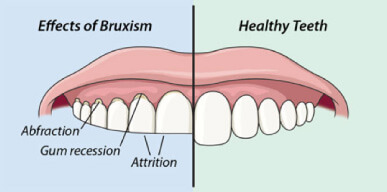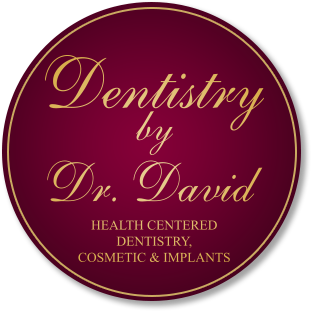Bruxism, or teeth grinding, is a common condition that people have. You may have been told by your dentist that you likely grind your teeth but can’t recall when and if you do this. Perhaps an oral appliance has been recommended to you to protect your teeth. Because you do not notice anything wrong with how your teeth are feeling, maybe you end up not thinking too much about the dentist’s findings. After years pass, a noticeable change in your bite has occurred as well as reduction in the size of your teeth. The reason you notice this is directly related to untreated bruxism. Because many people are unaware of their bruxism, they can present with various symptoms that seem to come out of nowhere.
Bruxism usually occurs at nighttime when you’re asleep and in a state of subconsciousness. If the body is not receiving enough oxygen while sleeping, our subconscious mind tells our body to advance forward the lower jaw to open the airway. This forward movement of the jaw is what grinds our teeth down on a nightly basis. So, why am I not getting enough oxygen? The answer is that there is likely a blockage somewhere in our natural passage for the air we breathe. This manifests as seep apnea and is usually treated with a continuous positive airway pressure machine (CPAP), and/or sleep appliance.
You may suffer from generalized tooth sensitivity and think it is normal. Every time you take a sip of hot coffee, or ice water, you experience painful ‘zinging’ throughout the entire mouth for a couple seconds. This can be contributed to bruxism. When untreated bruxism occurs long-term, tooth structure starts to weaken. This leaves microscopic cracks and fractures in the teeth that make drinking anything hot or cold uncomfortable. Many people believe that their dental sensitivity can be normal but fail to realize it is the body’s way of telling us there is a disturbance somewhere.
Not only does bruxism affect the teeth, but it affects the gums as well. People will often tell their dentist they notice their gum tissue is disappearing and not understand why. Just as the teeth weaken with active bruxism, the soft tissue surrounding the teeth weaken as well. The gum tissue surrounding the teeth will slowly shrink back from the tooth itself due to the pressure bruxism places on the teeth. Over time, the dark tooth root will become visible as the bone and tissue surrounding the tooth disappears. The exposed root surfaces can contribute to sensitivity as well as changes in the bite.
Don’t brush off bruxism when it is discussed at your checkup dental appointment. You might not notice right away, but bruxism will slowly destroy your teeth and supporting bone. Your dentist catching small wear facets on the teeth is important so that you can identify a potential sleep disorder and treat it appropriately. If bruxism is ignored, you will risk losing tooth structure that cannot come back without extensive restorative dental treatment.

